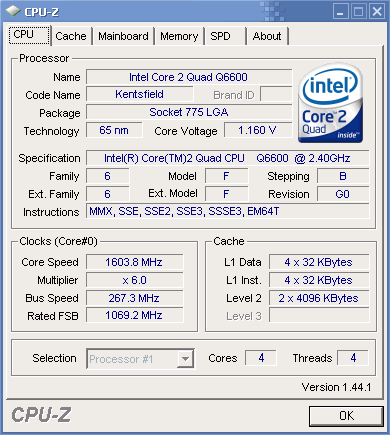I discovered
dmidecode a few months ago when trying to determine what type of RAM was appropriate for my desktop Linux machine at work. It's the Linux equivalent of Windows'
CPU-Z (a.k.a. CPUID). When you run it (which you have to do as
root), it will list all the
DMI-controlled components in your system. This means that it will tell you the type of CPU and which features it supports (such as MMX or SSE), CPU cache details, the type of RAM in use, the state of each RAM slot, USB interfaces, and most other devices that you would see listed in the device manager if you were running Windows.
It's a great tool for getting details about your dedicated server hardware, too. Of course, if you're a Windows user and you've never checked out
CPU-Z, you should do that! It serves up some juicy hardware details.
Here are the sorts of details you get from
dmidecode (these are the CPU details on my server):
Handle 0x0000, DMI type 4, 35 bytes
Processor Information
Socket Designation: LGA 775
Type: Central Processor
Family: Celeron
Manufacturer: Intel(R) Corporation
ID: (redacted)
Signature: Type 0, Family 15, Model 4, Stepping 9
Flags:
FPU (Floating-point unit on-chip)
VME (Virtual mode extension)
DE (Debugging extension)
PSE (Page size extension)
TSC (Time stamp counter)
MSR (Model specific registers)
PAE (Physical address extension)
MCE (Machine check exception)
CX8 (CMPXCHG8 instruction supported)
APIC (On-chip APIC hardware supported)
SEP (Fast system call)
MTRR (Memory type range registers)
PGE (Page global enable)
MCA (Machine check architecture)
CMOV (Conditional move instruction supported)
PAT (Page attribute table)
PSE-36 (36-bit page size extension)
CLFSH (CLFLUSH instruction supported)
DS (Debug store)
ACPI (ACPI supported)
MMX (MMX technology supported)
FXSR (Fast floating-point save and restore)
SSE (Streaming SIMD extensions)
SSE2 (Streaming SIMD extensions 2)
SS (Self-snoop)
HTT (Hyper-threading technology)
TM (Thermal monitor supported)
PBE (Pending break enabled)
Version: Intel(R) Celeron(R) CPU 2.80GHz
Voltage: 3.0 V
External Clock: 133 MHz
Max Speed: 4000 MHz
Current Speed: 2800 MHz
Status: Populated, Enabled
Upgrade: Other
L1 Cache Handle: 0x0001
L2 Cache Handle: 0x0002
L3 Cache Handle: Not Provided
Serial Number: Not Specified
Asset Tag: Not Specified
Part Number: Not Specified
And here is what CPU-Z says about my new desktop:

Pretty cool, eh? Oh, and Happy PI Day, everyone!
